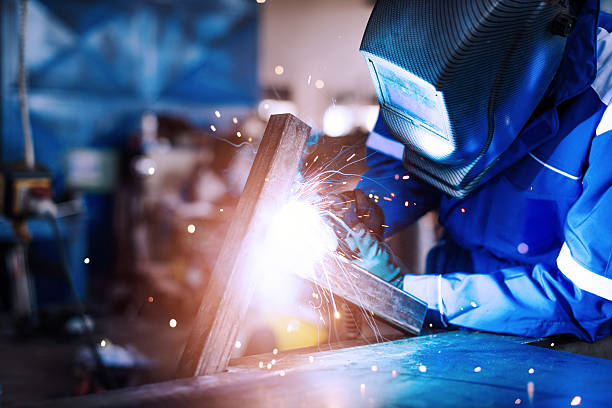Exact Welding Inspection Service for Metal Manufacture
Exact Welding Inspection Service for Metal Manufacture
Blog Article
Opening the Secret Sorts Of Welding Solutions for Your Projects
In today's landscape of diverse welding services, recognizing the nuances and applications of various welding methods is vital for effective task implementation - Welding Inspection Service. By untangling the key types of welding services offered, one can navigate the complexities of picking the most ideal strategy to make sure precision, efficiency, and high quality in welding jobs.
Typical Welding Methods
A number of typically used welding methods play essential duties in various commercial markets. One of the most extensively used techniques is Gas Metal Arc Welding (GMAW), also known as MIG welding.
An additional prominent welding technique is Gas Tungsten Arc Welding (GTAW), generally described as TIG welding. TIG welding makes use of a non-consumable tungsten electrode to create the weld and calls for a separate filler product. This method is preferred for its control, precision, and capacity to produce premium welds on slim products.
Shielded Steel Arc Welding (SMAW), or stick welding, is another crucial technique where a flux-coated electrode is made use of to develop the weld. SMAW is known for its simpleness, adaptability, and viability for on-site and outside welding applications. These typical welding techniques are crucial for making structures, equipment, and different equipment throughout markets.
Advanced Welding Procedures
Advanced welding procedures incorporate sophisticated methods that press the boundaries of typical welding approaches in regards to flexibility, performance, and precision. One such process is laser beam welding, which utilizes a concentrated beam to join steels with marginal heat-affected zones, making it perfect for high-precision or fragile jobs. Furthermore, electron beam welding employs a high-velocity electron light beam to create deep welds in thick materials, using exceptional strength and high quality.
Furthermore, friction stir welding is a solid-state joining procedure that uses a turning tool to produce frictional warm, bonding materials without thawing them. This approach is specifically beneficial for signing up with light-weight alloys with exceptional mechanical residential or commercial properties. One more cutting-edge strategy is ultrasonic welding, where high-frequency ultrasonic resonances are made use of to develop solid-state welds in plastics, steels, and various other materials, using rapid and tidy joining remedies.
These advanced welding procedures accommodate a varied series of commercial needs, offering reliable, top quality, and specific remedies for different projects, from aerospace components to automobile components and past.
Specialized Welding Applications

Automated Welding Solutions
In contemporary industrial settings, the execution of moved here automated welding remedies has actually transformed production processes by improving effectiveness and precision. Automated welding systems use check that sophisticated technologies such as robotics, computer system mathematical control (CNC), and man-made intelligence to execute welding tasks with marginal human treatment (Welding Inspection Service). These systems supply many advantages, consisting of boosted productivity, enhanced weld top quality, and reduced manufacturing costs
One key advantage of automated welding remedies is their capacity to continually produce high-quality welds, leading to boosted total item quality. Additionally, these systems can operate continuously, 24/7, without the need for breaks, leading to higher outcome degrees and faster project conclusion times. By using automated welding remedies, companies can also minimize the risks connected with human error, ensuring greater accuracy and repeatability in the welding process.
Moreover, automated welding services are very versatile and adaptable to numerous welding applications, from elaborate elements to large-scale frameworks. Whether in automotive manufacturing, aerospace sectors, or building projects, the assimilation of automated welding systems uses a competitive edge by improving procedures and delivering exceptional welding outcomes.
Cutting-edge Welding Technologies
The development of automated welding solutions has actually led the way for the combination and improvement of ingenious welding modern technologies in modern industrial applications. One such sophisticated technology is laser light beam welding, which uses a very concentrated light beam of light to sign up with metal parts with accuracy and performance. This approach is especially valuable for jobs calling for complex welds on products with high melting factors or for applications where marginal heat-affected areas are essential.
An additional innovative welding modern technology obtaining appeal is rubbing mix welding (FSW), a solid-state signing up with process that creates high-strength bonds by creating frictional heat between two items of steel. FSW is widely used in industries such as aerospace and vehicle for its ability to generate welds with exceptional mechanical homes and boosted architectural stability.
Moreover, electron beam of my review here light welding (EBW) is a sophisticated strategy that utilizes a light beam of high-velocity electrons to develop precise, deep welds in metal components. This technology is favored for its ability to weld dissimilar steels and products with differing densities efficiently. As markets remain to demand better and effectiveness in welding procedures, these ingenious technologies are poised to play a considerable role in shaping the future of industrial welding applications.

Verdict
To conclude, comprehending the crucial kinds of welding solutions is important for successfully finishing a variety of projects. From common welding strategies to advanced procedures, specialized applications, automated options, and cutting-edge modern technologies, each method uses special benefits and applications. By acquainting on your own with these various welding options, you can pick the most appropriate approach for your certain task demands and accomplish premium outcomes.
In today's landscape of diverse welding services, comprehending the nuances and applications of various welding techniques is critical for effective job execution. By untangling the crucial types of welding services available, one can browse the details of choosing the most appropriate approach to guarantee precision, effectiveness, and top quality in welding projects. As we get started on this exploration of welding services, a much deeper insight right into the globe of welding waits for, promising insights that can raise the results of your projects.

Report this page